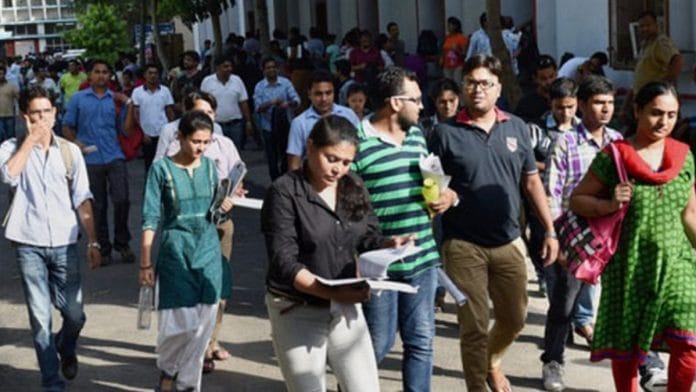New Delhi: Higher education institutes in India should re-model their assessment system to make them aptitude-based, the University Grants Commission (UGC) has suggested in its book, ‘Quality Mandate’, released last week.
The ‘Quality Mandate’ is a roadmap to improving higher education in India through various reforms, including in terms of improving quality of teachers, imparting life skills to students and changing the assessment pattern.
The mandate was adopted by the commission during a vice-chancellors’ meeting in 2018, following which the commission launched several schemes for universities to follow.
From measuring the learning outcomes to engaging with alumni, improving research quality and adoption of information and technology in education, the commission has launched many initiatives.
The 277-page book, a copy of which has been accessed by ThePrint, talked about all the initiatives in detail and explained how universities can implement them.
Also read: How students can save, transfer credits, design their own degree & more — UGC shows the way
Evaluation system, outcome-based education
One of the prominent topics the book talks about is the evaluation system.
Recognising the fact that the current evaluation or examination system in colleges and universities is “rigid and tests rote learning rather than focusing on broader skills”, the document suggested effective methods to change it.
“To ensure evaluation that is more student-oriented than examination-oriented, outcome-based education (OBE) is an important alternative and HEIs (higher education instituted) may need to implement this as early as possible,” the document said in the chapter on the evaluation system.
Under OBE, each student is expected to achieve a particular goal by the end of the academic period.
“The concept of OBE stresses the importance of demonstration of learning outcomes by students rather than just attaining marks in the examination,” the document read.
OBE starts with the clear statement of what knowledge, skills, and attitude a graduate will be able to demonstrate in a clearly measurable way, as having acquired on the successful completion of the programme, it added.
Last week, the commission had released a document on learning outcomes for history graduates.
After completion of the BA history course, a graduate will be expected to be able to articulate factual and contextual knowledge of specific places and times, and make careful comparisons (across time, space and culture), the document stated.
Ability to use bibliographical tools for the advanced study of history; to understand and evaluate different historical ideas, various arguments and point of view, and develop an appreciation of themselves and of others through the study of the past in local, regional, national and global context are other expectations.
The way to achieve this, according to the ‘Quality Mandate’, is to first establish clear mission statements and programme educational objectives (PEOs), which would indicate expected achievements graduates from a programme are supposed to attain a few years after graduation (usually three to five years).
The suggested methods of testing this are internal exams, university assent, written-oral exams, term work and even feedback from department heads.
Other reforms
The other reforms that are part of the book are induction programmes for students in colleges and universities; adoption of information and communication technology-based learning tools for an effective teaching-learning process; imparting life skills to students; and social and industry connect for every higher education institute.
Tracking of students’ progress after completion of the course; faculty development; quality research and creation of new knowledge; mentoring of non-accredited institutions so that every institution can get accreditation by 2022 are also among the reforms.
Also read: Modi govt’s HEC can’t just be UGC with new label. Engineering still needs its own regulator







No book education from school to college level includes practical DIY training on the subject they learn by memorization and are graded based on the theriacal exams given to the students. Unless the emphasis on book learning is removed, India has no hope in manufacturing anything to global standards. India needs far more vocational schools than book based High school and colleges. Most important, degrees in BA and BCom must be banned in India. The turned down students must be put in to vocational schools.
Banning degree programs is not a panache to achieve global standards. What is to be emphasized is more on the curricular delivery of the syllabus. Theory is the foundation, we need to include practical training, 360 degree internal evaluation which should be mandatory across disciplines. I appreciate the OBE outcome based evaluation which UGC is proposed for higher education which is the need of the hour.